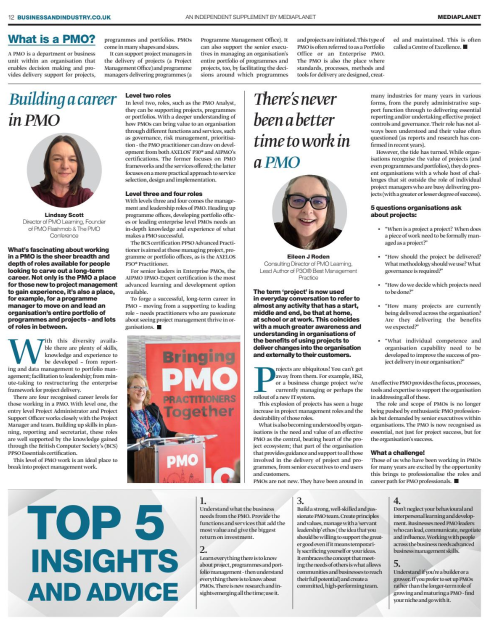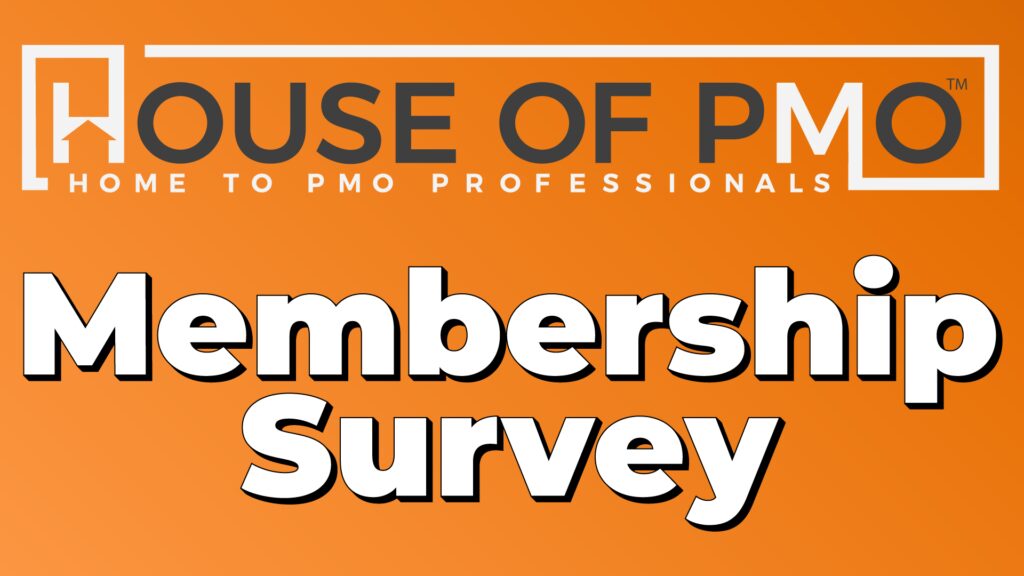You can find all our articles and past events
Free Articles | Inside PMO | PMO Conference | PMO Book Shelf
The PMO: Helping Project Management Thrive
Check out the article where PMO Flashmob gets a mentioned amongst all the project management stuff in the latest Project Management campaign from Media Planet which went out in the Sunday Telegraph on the 9th September.
Take a look at There’s Never Been a Better Time to Work in a PMO and Building a PMO Career.

The PMO Comes of Age
Eileen J Roden
Projects are ubiquitous! You can’t get away from them. For those working in and around projects, we may think of HS2, a business change project we’re currently managing or the rollout of a new IT system. However, the term ‘project is now used in everyday conversation to refer to almost any activity that has a start, middle and end – at home, at school and at work! This coincides with a much greater awareness and understanding in organisations of the benefits of using projects to deliver changes into the organisation and externally to their customers.
This explosion of projects has seen a huge increase in project management roles and the desirability of those roles.
What is also becoming understood by organisations is the need and value of an effective PMO, as the central beating heart of the project ecosystem; that part of the organisation that provides guidance and support to all those involved in the delivery of project and programmes – from senior executives to end users and customers.
PMOs are not new. They have been around in many industries for many years in various forms – from the purely administrative support function through to delivering essential reporting and/ or undertaking effective project controls and governance. Their role has not always been understood and their value often questioned (as recent reports and research has confirmed in recent years).
However, the tide has turned.
Whilst organisations recognise the value of projects (and even programmes and portfolios), they do present organisations with a whole host of challenges that sit outside the role of individual project managers who are busy delivering projects (with a greater or lesser degree of success).
These include:
- “When is a project a project? When does a piece of work need to be formally managed as a project?”
- “How should the project be delivered? What methodology should we use? What governance is required?”
- “How do we decide which projects need to be done?”
- “How many projects are currently being delivered across the organisation? Are they delivering the benefits we expected?”
- “What individual competence and organisation capability needs to be developed to improve the success of project delivery in our organisation?”
An effective PMO provides the focus, process, tools and expertise to support the organisation in addressing all of these!
The role and scope of PMOs is no longer being pushed by enthusiastic PMO professionals but demanded by senior executives within organisations. The PMO is now recognised as essential not just for project success, but for the organisation’s success.
What a challenge!
Those of us who have been working in PMOs for many years, are excited by the opportunity this brings to professionalise the roles and career path for PMO professionals.

Professionalising the PMO
Lindsay Scott
What’s fascinating about working in a PMO is the sheer breadth and depth of roles available for people looking to carve out a long-term career. Not only is the PMO a place for those new to project management to gain experience, it’s also a place, for example, for a Programme Manager to move on and lead an organisation’s entire portfolio of programmes and projects – and lots of roles in between.
With this diversity available there are plenty of skills, knowledge and experience to be developed – from reporting and data management to portfolio management; facilitation to leadership; from minute-taking to restructuring the enterprise framework for project delivery.
There are four recognised career levels for those working in a PMO. With level one, the entry level PMO Administrator and Project Support Officer works closely with the Project Manager and team. Building up skills in planning, reporting and secretariat, these roles are well supported by the knowledge gained through the House of PMO Essentials certification. This level of PMO work is an ideal place to break into project management work.
In level two, roles, such as the PMO Analyst, they can be supporting projects, programmes or portfolios. With a deeper understanding of how PMOs can bring value to an organisation through different functions and services, such as governance, risk management, prioritisation – the PMO practitioner can draw on development from both AXELOS’ P30 and House of PMO certifications. The former focused on PMO frameworks and the services offered, the latter, a more practical approach to service selection, design and implementation.
With level 3 and 4 comes the management and leadership roles of PMO. Heading up Programme Offices, developing Portfolio Offices or leading enterprise level PMOs needs an in-depth knowledge and experience of what makes a PMO successful. The House of PMO certifications are aimed at those managing Project, Programme or Portfolio Offices, as is the AXELOS P3O Practitioner. For senior leaders in Enterprise PMOs, the House of PMO Director level certification is the most advanced learning and development option available.
To forge a successful long-term career in PMO – moving from a supporting to leading role needs practitioners who are passionate about seeing project management thrive in organisations. Here are the top insights and advice:
- Understand what the business needs from the PMO and provide the functions and services that add the most value and give the biggest return on investment.
- Learn everything there is to know about project, programmes and portfolio management – then understand everything there is to know about PMOs. There is new research and insights emerging all the time, use them.
- Don’t neglect your behavioural and interpersonal learning and development, businesses need PMO leaders who can lead, communicate, negotiate and influence. Working with people across the business needs advanced business management skills.
- Build a strong, well-skilled and passionate PMO team. Create principles and values, manage with a ‘servant leadership’ ethos and create a committed, high-performing team.
- Understand if you’re a builder or a grower. If you prefer to set up PMOs rather than the longer-term role of growing and maturing a PMO – find your niche and go with it.

